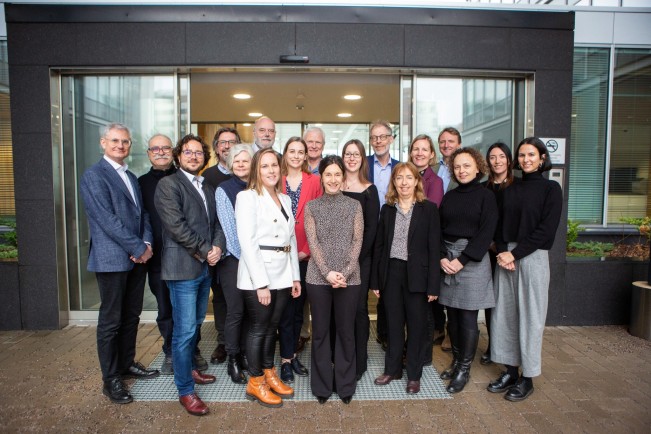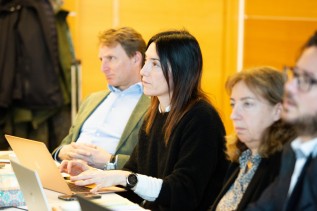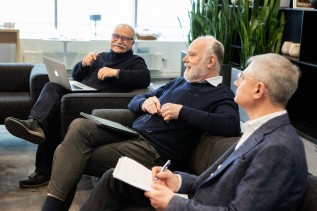
Our Collaboration
The Knowledge Exchange (KE) partners are six key national organisations within Europe tasked with developing infrastructure and services to enable the use of digital technologies to improve higher education and research: CSC in Finland, CNRS in France, DeiC in Denmark, DFG in Germany, Jisc in the UK and SURF in the Netherlands.
We share a clear vision that scholarship should be open. Through Knowledge Exchange we are working together to support the development of digital infrastructures to enable open science. We inform national and international policies and promote common approaches, to enable scholarship to cross national boundaries.
We share our knowledge, experiences and resources, bringing our experts together.
Our vision
Our mission is to enable open science by supporting an information infrastructure on an international level.
Our mission
Knowledge Exchange (KE) is a thought leader in the digital research ecosystem, addressing the challenges of keeping digital research infrastructure and policy aligned with rapid political, technological, and societal changes. KE is dedicated to exploring the impact of emerging technologies, security, and trust, and maintaining a commitment to openness. Our goal is to inspire and advise partners, stakeholders, and the wider community, helping them stay informed and prepared for the future.
Our strategy
Focus areas
The Knowledge Exchange (KE) will continue to conduct work on themes in the focus areas Open Access and Open Science. While these two areas are closely inter-connected, they will be treated as separate strands of activity.
Open Scholarship Framework
The KE OS Framework brings together three dimensions, i.e. ‘granularity' levels (e.g. individual, organisations, national governments), various arenas (e.g. political, economic, social) and research lifecycle phases (e.g. grant, dissemination). The established KE OS Framework is used to outline challenges and opportunities as well as possible activities that experts will work on.
Prioritised themes
Every four years KE re-evaluates its focus and priorities. The Strategic priorities for 2026 - 2030 are currently in review and are due to be published shortly.
For 2023 - 2025, four themes were identified that Knowledge Exchange will focus on within the focus areas Open Science and Open Access and with the economic, technological and social aspects of the KE OS Framework in mind:
- Assessing impact in the context of Open Science
- Innovation in scholarly communication and publication models of the future
- FAIR data and software supporting reproducibility of research
- The data science ecosystem
Strategic Priority Themes Knowledge Exchange in 2023-2025
Strategic priority themes Knowledge Exchange 2023-2025
Full details of the vision, mission and strategic priorities of Knowledge Exchange for 2023 to 2025
How we work
Structural exchange
We are committed to exchange between partner organisations all relevant developments, challenges and opportunities, as well as outcomes and results.
Each Knowledge Exchange partner organisation has appointed a representative and they meet regularly to exchange information and discuss opportunities to work on emerging challenges.
Exchange between experts
We bring together experts from each of our partner organisations and also from elsewhere when appropriate to identify urgent challenges and promising opportunities in their fields of expertise. This informs the decision-making of all partner organisations.
Knowledge Exchange's current focus is on open access and open science and we have expert groups in place for each. Their role is to identify issues and propose actions for Knowledge Exchange and this leads to studies, workshops and other activities. We involve experts from the wider research community and expert consultants as necessary.
Careful and flexible use of our resources
Each year, Knowledge Exchange partners' senior management meet in a strategy forum to confirm where we should focus our efforts for the coming 12 months. They reflect on the focus areas and prioritise aspects of these such as paying attention to sustainable business models.
Annual activity plans are refined with input from our expert groups and then approved by the Knowledge Exchange steering group. Annual plans are deliberately flexible whenever new developments or opportunities emerge we can very quickly mobilise our experts.
Before we engage in any activity the steering group considers:
- will working on this issue help partner organisations to work better?
- are other organisations already working on it? Or should they be?
- will Knowledge Exchange's active involvement really make a difference?
Sometimes it will be more efficient for us to leave some activities to other bodies, to partner with other organisations, or perhaps to bring relevant parties together and leave them to it.
Our history
Starting discussions in 2004, the first public announcement about the Knowledge Exchange initiative was made December 2005 at the Online Educa conference in Berlin. Four organisations: DEFF, DFG, Jisc and SURF signed a Collaboration Agreement for three years, and renewed the agreement in the following years. In 2013 CSC joined the initiative; in 2017 CNRS joined Knowledge Exchange as a partner.
In 2019 the six partners agreed to continue working together in Knowledge Exchange for another 3 years. In the same year DEFF was replaced by the Danish Agency for Science and Higher Education, followed by DeiC in 2020, as the partner organisation to represent Denmark.
End of 2021 partners agreed to continue the collaboration in Knowledge Exchange for another four years (until 31 December 2025).
The Knowledge Exchange is happy with the current membership organisations and is not actively looking for additional partners, without excluding the possibility of changes in membership in the future.








